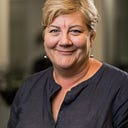Last week many commentators, politicians, journalists and others were debating the pros and cons of the David Gonski led review into educational excellence and the report of this review — Through Growth to Achievement.
At the heart of the report was a plan to better prepare students to succeed in a changing world.
I am not an educator or curriculum expert but I am someone who spends a lot of time listening to children and young people in schools. I ask them about what they think about life and school and their future.
I meet primary and secondary kids in public, catholic and independent schools, and in flexible learning centres and in OSHC and they are forthcoming on what they see are the weaknesses of their education and what they think they need in order to succeed.
My conversations with thousands of kids over the last year have highlighted that school, education and learning is the most important thing for South Australian children. They told me that school was a lot more than the subjects you study or what career you are working towards. It is about forming relationships, developing your own identity, feeling and being connected, learning how to participate in social structures and learning to be independent.
“Education makes you grow as a person, determining my future broadens knowledge”
They also told me that one of the top five things they would change to make their life better was to be more prepared for adulthood and leaving school. They told me they want to know more about everyday life skills that they are not taught at home. Things like voting, tax returns and renting a home, work skills, conflict resolution to deal with people and more education about social issues in Australian society.
At the core of what I heard was that education and learning are the most important things in life, but that what they are learning is at times lacking and the way they are being taught is not getting the best out of them.
Children and young people told me what a good learning environment looks and feels like. Given most kids spend a huge amount of time in school, doing school work at home or playing sport or other extracurricular activities for school, as well as talking about school to their mates, it is not surprising that they have a lot to say about what they want from school and teachers.
First and foremost they want teachers and the school adults to respect them as a person.
They also want:
· opportunities to have a say
· more freedom of speech to be encouraged to challenge and question and have different opinions
· more input into rules
· positive relationships with students and teachers
· teachers that care about your home life
· to feel safe and have fun
· a quality environment — not rows of desks, rather a “U” shape with everyone included and no backs to anyone
· practical ways to learn that help them join the dots to real life scenarios
· recognition of different styles of learning, with students taking over lessons and more peer led learning
· humour — “You are gonna remember something you laughed at”
· professional educators — like lawyers, doctors, social workers involved in education, not just teachers
· an opportunity to work with school leadership on teacher rating to improve performance
From what I have heard and read Gonski is on the same page as South Australian kids. One of the three priorities of Gonski’s report is to equip every child to be a creative, connected and engaged learner in a rapidly changing world. One of the report’s key recommendations is to ensure students have the opportunity within schools to be partners in their own learning. Both of these are in sync with what children and young people have spoken to me about.
They know that the jobs of the future will be high tech, high touch, high care. They need different skills to do these jobs and work in teams, with people across the world and with machines as well as people. Tasks that need to be completed will be non-routine, and they will need to be able to adapt to change and be able to think and have advanced problem solving skills. They will need to know how to learn from their experiences and apply to new contexts and have the resilience to take risks and fail. They need to be able to create the solutions to the problems that the new world will produce. The increased diversity of gender, ethnicity and culture in the workplace will also require excellent interpersonal skills and ways to manage relationships.
The change required needs to start now and, as kids have said “we need education and learning to be about kids and their needs, not schools and their needs.” Kids want to be more involved, connected to real life, engaged in the process of education and approaching the future with optimism and hopes about the future!
Helen Connolly, Commissioner for Children and Young People SA.
Thursday 10th May 2018
